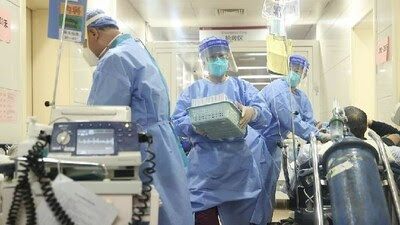BEIJING, Dec. 31, 2022 /PRNewswire/ — Ninety-year-old Qu Fucheng was waiting for his COVID-19 treatment in Wuhan Zhongnan Hospital when his son realized how crowded the emergency department was.

“My father was in very critical condition at home, ” the son told CGTN, frowning. “If something had happened to him because I didn’t handle the situation well, I don’t know how I would ever have been able to forgive myself.”
The deputy head of the department said they had seen “a significant increase” in the number of patients, while most of the severely ill were senior people with underlying diseases.
In a bid to leave no patient unattended, the emergency department converted the emergency observation room into a buffer zone to reduce waiting time.
And that’s where Qu Fucheng was transferred to.
“Seeing my father’s serious condition, the doctors immediately took him to one of the beds,” the son said. “I thought it wouldn’t have gone that smoothly when I was at home.”
To treat as many patients as possible, all medical personnel and equipment have worked around the clock with full “combat effectiveness.” After receiving first aid treatment, Qu’s condition soon saw some improvement.
Head nurse Tian Yu told CGTN that a buffer zone is not enough to smooth the workflow, adding that a good workflow is critical for the emergency department.
No “hospital run”
Such measures are being taken in many emergency wards across China, as the country saw an increase in COVID patients after lifting some of the COVID restrictions.
Some worried there will be too many patients for the hospitals to host, leading to a so-called “hospital run” like a bank run during an economic crisis. Luckily this didn’t happen thanks to timely adjustments in hospitals.
Cities like Beijing built more temporary fever clinics, while others like Chongqing expanded existing fever-treating department and reassigned doctors from other departments to support COVID treatment.
Online solution
The Chinese government also expanded online medical services for COVID-19 patients on December 12. Areas like Beijing, Zhejiang and Hunan have already put the new policy into practice.
“The online medical services can provide consultation and medication guidance for more patients who stay at home,” Jiao Yahui, head of the Bureau of Medical Administration under NHC, told China Media Group. “Prescriptions can be made online and drugs would be delivered offline, which can ease the pressure of visiting doctors offline, and avoid crowds in hospitals to reduce the risk of cross-infections.”
Photo – https://mma.prnewswire.com/
